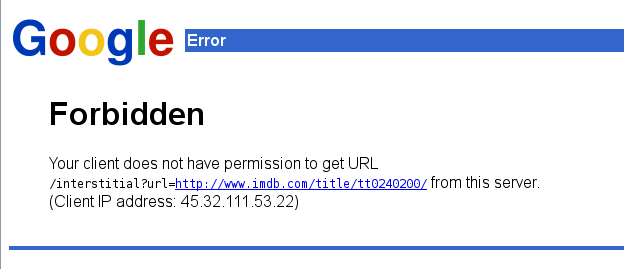This morning Google’s search results don’t work.
Let’s say you search Google for water. Then:
Each result has a warning under its link “This site may harm your computer”:

Clicking on the link doesn’t take your browser to the page as usual, but brings up an error message.

Clicking on the “This site may harm your computer link” produces a help page with the title “Concerns About Web Search Results: Results labeled ‘This site may harm your computer'”:

So now I search Google for “Concerns About Web Search Results: Results labeled ‘This site may harm your computer‘”. The first result is a Google support page at
http://www.google.com/support/websearch/bin/answer.py?hl=en&answer=45449
But accessing that page leads to another error (no screen shot):
We’re sorry…
… but your query looks similar to automated requests from a computer virus or spyware application. To protect our users, we can’t process your request right now.
What a mess!
Questions
- Should visiting any web page really “harm your computer”?
- On what basis would Google think that a web page is going to “harm your computer”? Does it take into account or even know what kind of computer you are using?
- If Google had reason to believe a web page were to “harm your computer”, should the page be really listed as a search result? (Less is more?)
- If a search result page is not marked with the warning, would you blame Google if you then visited the search result page and your computer came out “harmed”?
- Are these search result page getting too crowded altogether? craigslist has barely changed their listing format and they’re doing just fine.
Update
Of course, this was a temporary glitch. According to google’s blog, “the errors began appearing between 6:27 a.m. and 6:40 a.m. and began disappearing between 7:10 and 7:25 a.m. [PST]”. (So I ran into this just towards the end, around 7:20). The problem’s root cause is given as:
“Unfortunately (and here’s the human error), the URL of ‘/’ was mistakenly checked in [to a list of bad URL’s] as a value to the file and ‘/’ expands to all URLs”.
And it wasn’t StopBadWare.org’s list as Google had originally posted. (The two organizations work together on this list). Well, mistakes happen …